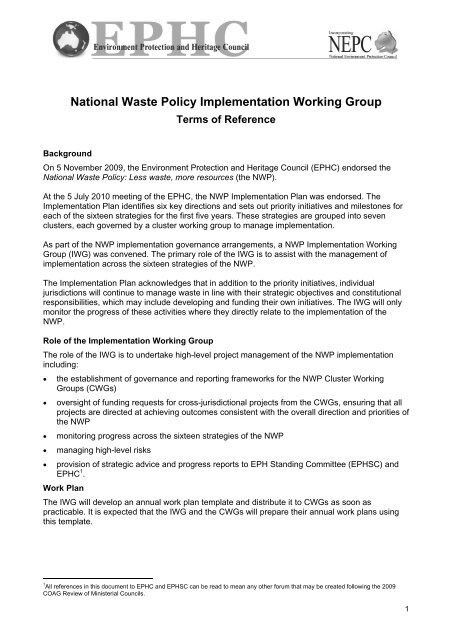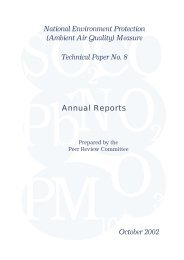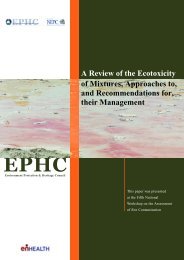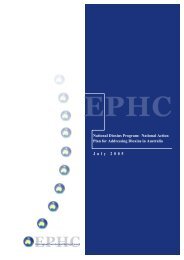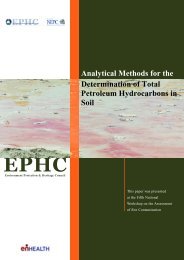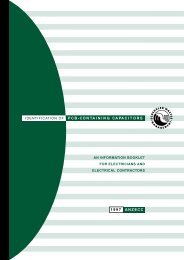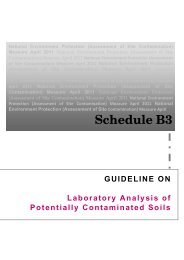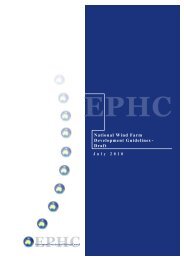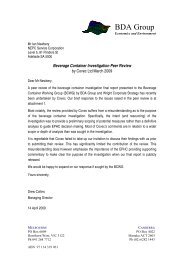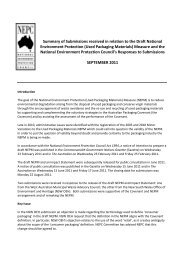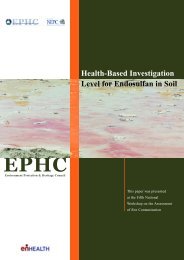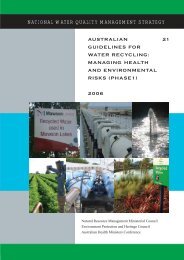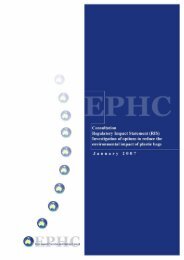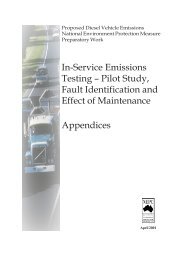National Waste Policy Implementation Working Group
National Waste Policy Implementation Working Group
National Waste Policy Implementation Working Group
You also want an ePaper? Increase the reach of your titles
YUMPU automatically turns print PDFs into web optimized ePapers that Google loves.
<strong>National</strong> <strong>Waste</strong> <strong>Policy</strong> <strong>Implementation</strong> <strong>Working</strong> <strong>Group</strong>Terms of ReferenceBackgroundOn 5 November 2009, the Environment Protection and Heritage Council (EPHC) endorsed the<strong>National</strong> <strong>Waste</strong> <strong>Policy</strong>: Less waste, more resources (the NWP).At the 5 July 2010 meeting of the EPHC, the NWP <strong>Implementation</strong> Plan was endorsed. The<strong>Implementation</strong> Plan identifies six key directions and sets out priority initiatives and milestones foreach of the sixteen strategies for the first five years. These strategies are grouped into sevenclusters, each governed by a cluster working group to manage implementation.As part of the NWP implementation governance arrangements, a NWP <strong>Implementation</strong> <strong>Working</strong><strong>Group</strong> (IWG) was convened. The primary role of the IWG is to assist with the management ofimplementation across the sixteen strategies of the NWP.The <strong>Implementation</strong> Plan acknowledges that in addition to the priority initiatives, individualjurisdictions will continue to manage waste in line with their strategic objectives and constitutionalresponsibilities, which may include developing and funding their own initiatives. The IWG will onlymonitor the progress of these activities where they directly relate to the implementation of theNWP.Role of the <strong>Implementation</strong> <strong>Working</strong> <strong>Group</strong>The role of the IWG is to undertake high-level project management of the NWP implementationincluding:• the establishment of governance and reporting frameworks for the NWP Cluster <strong>Working</strong><strong>Group</strong>s (CWGs)• oversight of funding requests for cross-jurisdictional projects from the CWGs, ensuring that allprojects are directed at achieving outcomes consistent with the overall direction and priorities ofthe NWP• monitoring progress across the sixteen strategies of the NWP• managing high-level risks• provision of strategic advice and progress reports to EPH Standing Committee (EPHSC) andEPHC 1 .Work PlanThe IWG will develop an annual work plan template and distribute it to CWGs as soon aspracticable. It is expected that the IWG and the CWGs will prepare their annual work plans usingthis template.1All references in this document to EPHC and EPHSC can be read to mean any other forum that may be created following the 2009COAG Review of Ministerial Councils.1
Under the <strong>Implementation</strong> Plan, the IWG will report on progress to EPHSC, and will provide annualreports on NWP implementation to EPHC. The EPHC has stipulated that these annual reports willbe made public. The EPHSC will be responsible for agreeing and monitoring collaborativeinitiatives to implement the NWP. EPHSC will also agree any updates to the <strong>Implementation</strong> Planand the IWG will oversee, as well as provide advice on, an evaluation of the NWP prior to 2020.Once finalised, the IWG work plan must be provided to EPHSC for endorsement and will form anattachment to these Terms of Reference.MembershipThe IWG is co-chaired by the Australian Government and Queensland. Other members are fromNew South Wales, Victoria, and South Australia (see Attachment A). Membership of the IWG hasbeen established at a senior level to ensure that this group can provide high-level strategic advice.Where a member cannot attend, a nominated proxy will be accepted. Observers may attend at theco-Chair’s discretion.If the IWG requires expert advice, attendance of an expert will be at the discretion of the co-Chairs.The co-Chairs may invite representatives from relevant government departments, organisations orbusinesses as required. Members fund their own participation in the IWG.Administrative supportThe <strong>National</strong> Environment Protection Council Service Corporation (NEPSC) 2 will provide generaladministrative support for the IWG. Administrative support may involve arranging meetings anddistributing papers, as well as collating and coordinating reports and funding requests forconsideration by EPHSC and EPHC. The IWG members will be provided with an agenda prior toeach meeting, and a summary record of the meeting and actions arising will be distributed to allworking group members as soon as practicable after each meeting.The Australian Government will provide additional high-level support, where required.Frequency and conduct of meetingsThe IWG will meet regularly to progress its work, with a minimum of two meetings per annum.Teleconferences will be used where appropriate to minimise time and expense to members andother participants.ReportingThe IWG is responsible for reporting to EPHSC and EPHC on the activities and progress of eachof the CWGs and for coordinating funding requests. The Chairs of each of the CWGs will beresponsible for providing timely and accurate advice to the IWG.ConfidentialityDiscussions of the IWG are ‘government-in-confidence’. The IWG will agree on what, if any,information should be released into the public domain.Sunset ClauseThe ongoing role of the IWG will be reviewed prior to the end of 2011.Contacts<strong>National</strong> Environment Protection Council Service Corporation (NEPSC)Phone: 08 8419 1200 Email: exec@ephc.gov.au2NEPSC’s role in providing administrative support to working groups will be subject any changes to EPHC arrangements arising fromthe 2009 COAG Review of Ministerial Councils.2
Attachment A<strong>Implementation</strong> <strong>Working</strong> <strong>Group</strong> Members ListName Jurisdiction PositionDiana Wright (co-Chair) Australian Government First Assistant SecretaryEnvironment Quality DivisionDepartment of Sustainability, Environment,Water, Population and CommunitiesTony Roberts (co-Chair) Queensland Executive DirectorPlanning DivisionThe Department of Environment and ResourceManagementStuart McConnell Victoria DirectorResource and Regulatory EfficiencyEPA VictoriaBernard Carlon New South Wales Divisional DirectorSustainability ProgramsDepartment of Environment, Climate Changeand WaterTony Circelli South Australia DirectorRegulation and ComplianceEPA South Australia3


